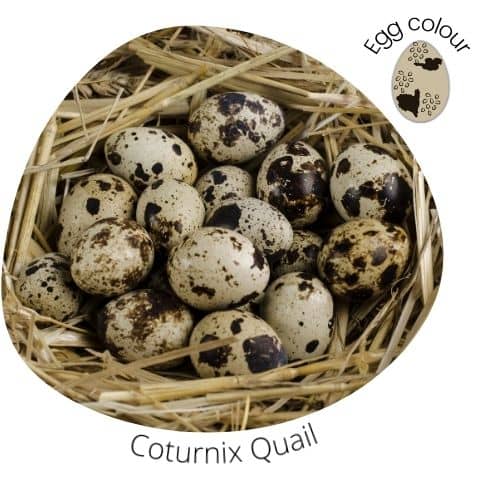Coturnix Quail
Also called The common quail, European quail or Coturnix Quail. They are a great addition to any family as they mature faster the chickens (around 7 to 8 weeks) and produce a wonderful return of eggs for the table that are full of protein and can be boiled, fried, poached, scrambled and put into omelettes and cakes. They come very friendly after a short time of being handled and the males make a lovely triple crowing sound.
Cost per Egg: £1
Cost per week old chicks: £5
Cost per Pullets (point of lay) £9
Description
The common quail, or European quail, is a small ground-nesting game bird in the pheasant family Phasianidae. They are also referred to as Coturnix.
Wildtype (Pharaoh) Quails are distinctive due to the combination of their stocky bodies and long, pointed wings. Their upperparts are brown, streaked and barred with buff, while their underparts are a warm buffy orange. There are other colours available Buff, English White, Pied, Tuxedo, Rosetta, Tibetan, Cream, Red, Ginger etc
They are a great addition to any family as they mature faster the chickens and produce a wonderful return of eggs for the table that are full of protein and can be boiled, fried, poached, scrambled and put into omelettes and cakes. They are really used in the same way as hens eggs, but with belonging to the partridge family, they taste just slightly gamey.
They are also a dual-purpose bird, like Faverolles or Dorkings, meaning they are bred for their eggs laying capability and their carcase. Admittedly you should serve 2 per person but they are easy to dress and prepare for the oven. They are a delicacy in Asia and their reputation is growing quickly in Europe.
Coturnix Quail are fully grown in 7 to 8 weeks when they commence laying and the cycle continues. Incubation is only 16 days and they are like little bumble bees when they hatch.
They should be kept in an area providing around 6 inch x 6 inch per bird that will allow them space to move around to stop them getting bored and pecking each other. Their feathers provide extra protein that their bodies desire so make sure you feed them the correct food to stop them feather pecking. Heygates are just one of the manufactures that provide the pellets that have the extra protein, which poultry layers do not have.
A cage 24 inches x 12 inches should house no more than 6 Quail and put in some cover and small boxes for them to go into. Water should always be available that will help with their egg production.
When Quail are spooked they take off vertically so the pen needs to be at least 10 inches tall. The more room you can give them the better, and even a small net under the top to stop them hitting their heads on the top of the cage when they take off. When you go towards the cage always approach carefully and slowly and they will be fine.
They come very friendly after a short time of being handled and the males make a lovely triple crowing sound.
Cost per Egg: £1
Cost per week old chicks: £5
Cost per Pullets (point of lay) £9
Additional information
| Egg Colour | Cream to Light Brown |
|---|

